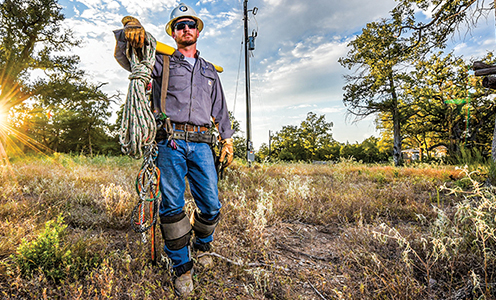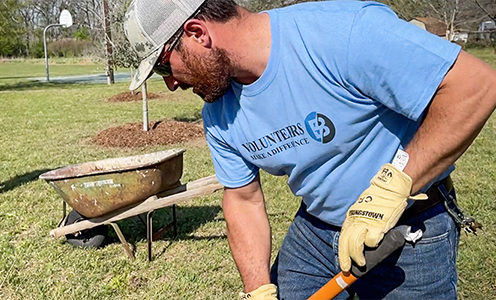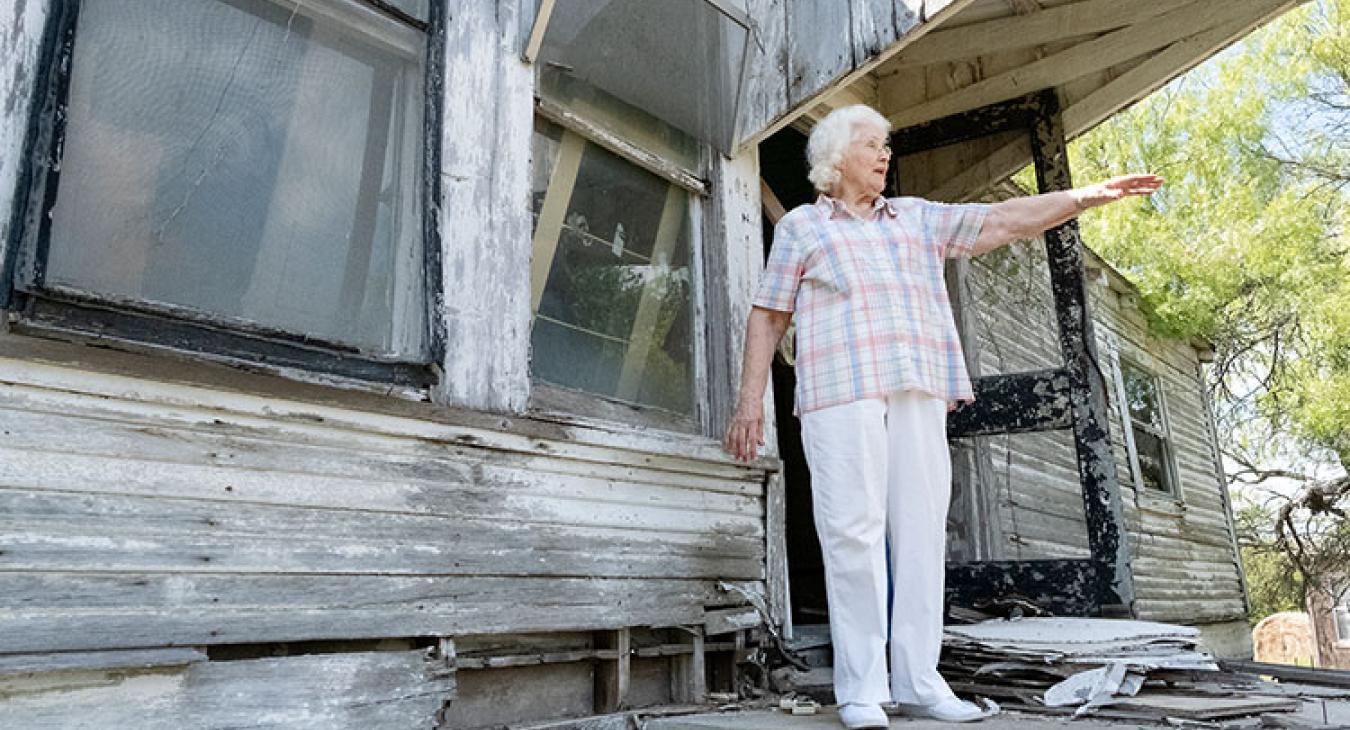From the back porch, Jo Nell Schulze shares fond memories of growing up at the house she moved into at age 8. (Ralph Barrera photo)
At First Light: Remembering the Dawn of Electricity
This is one in a series of stories about some of Bluebonnet Electric Cooperative’s earliest residential members
By Clayton Stromberger
The time-worn house sits a distance off the county road, nestled among weeds, dormant wildflowers, yuccas and a few thirsty-looking trees. It’s ringed by weathered structures of an earlier era: a listing tin-roofed garage, a dark metal cistern on concrete legs, the old post-and-wire pen in the back for calves. Out front, a tractor rusts where it was last parked decades ago.
“There’s the old homeplace,” Jo Nell Schulze says quietly as she walks up the dirt drive at a steady, eager clip.
We are just a few minutes’ drive southeast of downtown Lockhart, out on Seawillow Road, and Schulze, who will be 84 on Nov. 18, is paying one of her occasional visits to her maternal grandparents’ old homestead. She moved in with her grandparents in 1943 when she was 8, after her parents divorced. She arrived with her mother, Maxine Boyd, and younger brother and sister.
Maxine’s parents, Dudley and Florence Littleton, farmed and raised cattle on this land, which goes “all the way back to Plum Creek,” Schulze says. She lived in the house until she married her high school sweetheart, Albert “Pete” Schulze, at age 18, after he graduated from Lockhart High School.
No one has lived here since Schulze’s mother died in 2009. Florence Littleton died in the early 1960s, and “Dud” Littleton died a few years later.
“He grieved himself to death,” Schulze says. “He would just sit on the front porch and say, ‘I want to go, I want to go.’ ”
Schulze’s brother, Mackey Boyd, lives in nearby McMahan. His son, Britt Boyd, who lives between Lockhart and Luling, is remodeling the interior of the house. Schulze’s sister, Nelda Fox, lives in Corpus Christi.
Schulze, who lives in Lockhart now, drops by the old homestead every once in a while to check on things and see how the remodeling is going.
“The old windmill is gone, I just noticed,” Schulze comments as she approaches the front of the house. “It used to squeak all through the night.”
The hoary old mesquite tree in the front yard with the strange, down-curving trunk – perfect for hopping on and sliding down – is showing its years but still carries some green sprouts.
“Every kid rode that tree for a horse,” Schulze says, laughing. “Every thorn on it has been scooted off. And I bet there were four kids who fell off it and broke their arms.”
The frame of the structure still stands strong, but the white paint is peeled and the wooden front porch is gone. Inside are exposed boards and old nails poking out here and there. None of that deters the spry Schulze, who steps over obstacles to re-enter the old home through the back door.
Schulze has spent most of her life within a few miles of this spot. She was born in the old community of Seawillow, just a few miles to the south. Her family on her mother’s side, the Browns, have been in the area “for a long time,” Schulze says, and helped found the old community of Brownsboro, a bit south of Seawillow.
The 10 years in which Schulze grew up in her grandparents’ home coincided with the time in which electricity’s arrival to the region – starting in 1939 and continuing throughout the early 1940s – set off a ripple of change in rural Caldwell County, farmhouse by farmhouse. The power lines came from Bluebonnet Electric Cooperative (at that time named the Lower Colorado River Electric Cooperative).
Schulze can’t remember the date her grandparents first turned on an electric light in the old house. But before electricity, Schulze remembers her grandparents carrying coal-oil lamps from room to room during her visits as their first grandchild. She still has the base of one of those lamps in her home. She also can clearly picture her grandparents’ old wooden ice box.
“Granddaddy would go to town on Saturdays,” Schulze says, “and he'd take a tote sack with him, and he would go to the ice plant and get a big block of ice and put it in that ice box. And hot dog, we were going to have iced tea then!” She laughs. “That block lasted about three days. My grandmother kept her milk and eggs in the top shelf.”
By the time Schulze moved in with her grandparents, they had installed electric lights. But for some reason they hadn’t installed outlets in the walls. So when her grandfather took the plunge and bought his first appliance – a refrigerator – he had to run an electric cord up through the ceiling to the light fixture.
“The refrigerator was in the hallway because there wasn’t room for it in the kitchen,” Schulze recalls. “They would say, ‘Don’t open that door, you’ll run up the electric bill!’ We had those little ice trays and I bet we’d drink a gallon of water a day just (so we could) get that ice out of there.”
Next came an electric stove to replace the one that burned coal oil. And then a radio. “Granddaddy would turn it on,” Schulze says, “and we had to be quiet as we could be. We could not laugh, talk, cut up or anything because he was going to listen to his programs.”
Among his favorites were the top shows of the day, including "The Lone Ranger" and the husband-and-wife comedy "Fibber McGee and Molly."
Finally, in the early 1950s, it was time to enter the modern era with a black-and-white television, courtesy of Dud and Florence’s four children – Maxine Boyd and her sister and brothers – as a gift for the couple’s 50th wedding anniversary.
“Granddaddy was old at that time, and he loved that television, because he talked with it,” Schulze remembers, smiling. “They would eat lunch real quick and then go in and watch "As the World Turns." There was a character who liked the ladies, and Granddaddy would fuss at him and tell him he didn't know what he was talking about. My grandmother would just laugh and say, ‘Oh, Dud, that’s not real!’”
The old house is filled with happy memories for Schulze. The family always gathered here for Christmas. As she moves from room to room, she sees her grandmother’s chifforobe. Large and difficult to move, it is still in its spot. And under a covering in the front room sits the piano her aunt used to play.
Schulze feels pangs of loss, too, as memories return. Her husband, who co-owned Alex and Schulze Garage in Lockhart, died in 2007. “He was a good man,” Schulze says. The couple raised three children in Lockhart: Son Terry lives in Rockport, son Ronny lives nearby on Seawillow Road and daughter Darla Law lives in Lockhart.
Standing in her grandparents’ old “sunporch” bedroom in the back of the house, Schulze's face brightens as the big windows suffuse the barren room with morning light.
She focuses not on what is gone, but on the joy of what was.
“We would all sit back here, and when those windows were open, oh, the nicest cool breeze would blow through.”
Download this story as it appeared in the Texas Co-op Power magazine »





